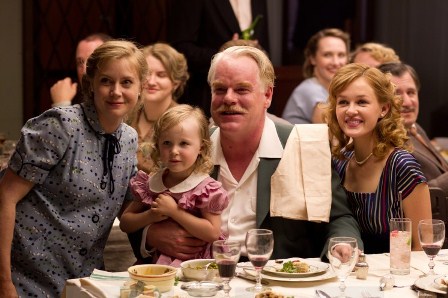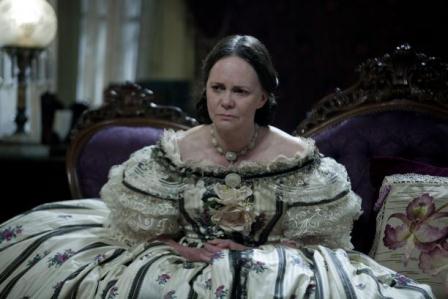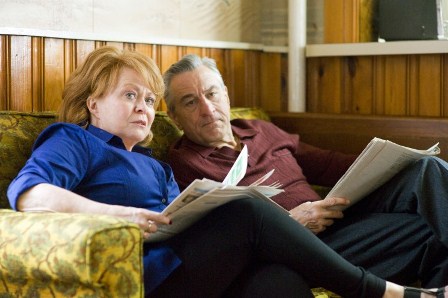CHICAGO– A mother trying to protect her son from an assassin, a man who coordinates lap dances for a living, a woman whose dreams have died, a gambler betting on his son, and two people at the heart of Abraham Lincoln’s fight to end slavery and the Civil War — 2012 certainly offered a wide array of memorable supporting characters in motion pictures. These are simply my 20 favorites (and come back later today for the accompanying lead performances).
The Best Supporting Actresses of 2012
Five Runner-ups (in alphabetical order): Samantha Barks (“Les Miserables”), Judi Dench (“Skyfall”), Isabelle Huppert (“Amour”), Shirley MacLaine (“Bernie”), and Emma Watson (“The Perks of Being a Wallflower”).

Amy Adams in The Master
Photo credit: The Weinstein Company
A lot of actresses might have taken the role of The Master’s wife and merely turned it into a variation on the character Amy Adams played in “Doubt,” the reticent, silent type who stands by her powerful man. What Adams did was far more complex, sketching a woman who knows deep down that her husband is not the intellectual and spiritual powerhouse that he pretends to be. And yet Peggy Dodd is no mere Lady MacBeth (another easy route an actress could have taken with the part). She is the support structure when her husband begins to falter. In many scenes of “The Master,” she’s often the one that catches your eye most, even in moments when Joaquin Phoenix and Philip Seymour Hoffman are giving much broader performances. She has a quiet strength and intense confidence that some people probably didn’t expect a generally high energy actress like Adams to bring to the part. If her performance in “The Master” proves anything, it’s that it’s time for us to stop thinking that there’s anything Amy Adams cannot do.
Emily Blunt in Looper
Photo credit: Sony
For a solid hour, “Looper” is a very good movie, one of the best of 2012, but it becomes a truly great one once Emily Blunt makes her first appearance, holding a shotgun at our complex anti-hero in a field of corn. She grounds the entire second half of Rian Johnson’s incredible sci-fi experience in something emotional and relatable. She’s the heart of a very intellectual piece and she delivers with one of the most fascinating and underrated performances of her career. Sara isn’t a time traveler or some other story point that needs an intellectual understanding or plot-hole dissection — she’s just a mom trying to protect her family. Emily Blunt shows more remarkable range with every role she takes and this is one of her best.

Rosemarie DeWitt in Your Sister’s Sister
Photo credit: IFC Films
I have some issues with Lynn Shelton’s “Your Sister’s Sister”, but there’s a scene early on when Rosemarie DeWitt’s Hannah is getting drunk and conversational with Mark Duplass’ Jack that is pure joy to watch. DeWitt just keeps asking questions. Is she flirting with Jack? Is she just playing with him? And when Hannah’s true motives are revealed, DeWitt takes this character to an entirely different level. She is such a fascinating character that she actually steals focus from Duplass and Emily Blunt. Whenever the story leaves her, it sags a bit. We want to follow Hannah, even if we know it’s probably not the best thing for us.

Sally Field in Lincoln
Photo credit: DreamWorks
After years on TV on “ER” and “Brothers & Sisters,” I think most of us had written off Sally Field as an actress of importance in cinema. But, from her very first scene in Steven Spielberg’s epic retelling of the last few months of Lincoln’s life, which were some of the most important in American history, Field gives a powerhouse performance. At first, I was concerned that she would merely capture the “bigger” moments — the weeping over Mary Todd’s lost son, the arguments with her husband, the key speeches — and those all work expectedly well, but what I like about Field’s performance is the way it truly defines the word “supporting.” She makes one of the most acclaimed performances of the last decade stronger in the way she balances Day-Lewis’ acting style with her own. We believe from minute one that she is not just a partner to Abraham Lincoln, but an inspiration for him to lead and someone who challenges him intellectually. That’s not as easy as it looks. Field may have taken some time off from film acting, but she didn’t lose a beat in the process.
Anne Hathaway in Les Miserables
Photo credit: Universal
There have been many remarkable screen moments in 2012 – ranging from the deprogramming of Freddie in “The Master” to the plane crash in “Flight” to the tsunami in “The Impossible” to, well, take your pick from “Holy Motors” - but it is one woman, one song, and one camera angle that will define the year cinematically. Three decades from now, when people look back on the history of musical film, Anne Hathaway’s performance of “I Dreamed a Dream” will be a part of any montage, any discussion, and any analysis of the genre. It is an absolute breathtaker and the reason it works as well as it does is director Tom Hooper’s trust in his actress. He knew to put the camera on her and let her sing live. It’s not pre-recorded. It’s not lip-synced. It’s heartfelt, painful, and devastating. And, while “Dream” is the peak of her performance, Hathaway is strong throughout “Les Miserables,” to the point that the movie takes some time to recover when she leaves and eventually storms the emotional barricades once she returns. That’s true support — the film nearly falls down without her.
The Best Supporting Actors of 2012
Five Runner-ups (in alphabetical order): Jason Clarke (“Zero Dark Thirty”), Leonardo DiCaprio (“Django Unchained”), Dwight Henry (“Beasts of the Southern Wild”), Samuel L. Jackson (“Django Unchained”), and Christopher Walken (“Seven Psychopaths”).

Robert De Niro in Silver Linings Playbook
Photo credit: The Weinstein Company
In the first minute of his first scene, when he realizes his son has returned from a mental hospital earlier than expected, I said to myself, “Oh my God, that’s Robert De Niro. Where has he been?” To be frank, the actor, who deservedly merited comparison with the best of all time in the ’70s and ’80s, had recently disappeared into easy roles in junk like “Little Fockers” and “Righteous Kill.” But, in those first moments of “Silver Linings Playbook”, it was like seeing an old friend again as I witnessed not only the passion for acting that De Niro seemed to be missing recently but also the beginnings of a truly well-rounded character. De Niro perfectly captures a man on his own verge of a nervous breakdown, an OCD gambler/bookie who seems perpetually bottled up in anticipation of something going wrong - the Eagles miss the field goal, an envelope goes missing, his son has a breakdown. He finds the truth in this man, one of many who wakes up every day worried about their finances, family, and favorite team.

Michael Fassbender in Prometheus
Photo credit: Fox
Even the sharpest detractors of Ridley Scott’s “Prometheus” had nothing negative to say about Michael Fassbender’s mesmerizing performance as David, the android fascinated by the history of mankind. From his very first scenes wandering the ship alone, mimicking human behavior and watching his shipmate’s dreams, Fassbender finds something very unique in David. He’s not merely a robot and yet he’s not your typical “I wanna be a real boy” android either. He’s something in between, fascinated and fueled by the idea that mankind was created by more powerful beings just as he was. Fassbender balances humor, malevolence, and intellectualism into one of 2012’s most interesting characters. The movie (arguably) didn’t work, but that doesn’t make Fassbender’s work any less worthy of merit.
Tommy Lee Jones in Lincoln
Photo credit: DreamWorks
Tommy Lee Jones, like De Niro, is one of those actors who can sometimes phone it in. And so, when we see him in a part that seems to captivate him enough to use all of his acting tools, it can be a reminder that he’s one of our best living actors. Here, Jones uses his gruff persona to maximum effect as he turns what we expect from his character on its head. When we see an angry-looking man like Jones in a period piece, the assumption is that this old codger will be the villain, but Jones reveals layer after layer underneath the scowl, until his arc becomes nearly as important to the history of America as Lincoln’s. Most importantly, as much as anyone in “Lincoln,” Tommy Lee Jones feels like he’s simply in the moment. The stakes feel real when he eloquently defines them and one only wishes Jones would find parts that challenged him as completely as this one more often.

Matthew McConaughey in Magic Mike
Photo credit: Warner Bros.
2012 was arguably the year of Matthew McConaughey (even if Channing Tatum may argue with that title). Finally clawing his way out of the pit of romantic comedies that sucked away his ability for years, McConaughey delivered in a series of films, including “Bernie,” “Killer Joe,” and “Magic Mike.” It helps to work with directors like Richard Linklater, William Friedkin, and Steven Soderbergh — ones who know what this charismatic actor is capable of delivering. Let’s hope 2012 was not a fluke but rather the start of another chapter. As for Dallas, there’s not a single scene that McConaughey is in that he does not steal, and his dramatic moments near the end are the highlights of the entire film. In many ways, Dallas’ story is more interesting than Mike’s. He’s a man who has seen a hundred Mikes rise and fall, but he’s still here. McConaughey channels a little bit of his own career into this character. We may have thought his time for acting glory had come and gone, but he’s still here. And better than ever.

Philip Seymour Hoffman in The Master
Photo credit: The Weinstein Company
Quite simply one of the most captivating performances of all time came this year from Philip Seymour Hoffman, working with regular collaborator P.T. Anderson yet again to portray an unforgettable character. Who is Lancaster Dodd? Is he a powerful religious leader? A charlatan? A family man? A spiritual guide? A scumbag? He’s all of the above in Hoffman’s hands. So many actors would have narrowly defined Lancaster Dodd, playing up the snake-oil salesman part of his persona in easy ways. But Hoffman delivered one of the most multi-faceted performances in years. And is there any actor who feels more truly in the moment than Hoffman? You never see the artifice. His line readings and actions feel instinctual and spontaneous even though they’re merely the blocked actions and memorized dialogue of an actor. Hoffman finds truth in everything he touches. And “The Master” may be his most truthful performance to date.
 | By BRIANTALLERICO |